|
|
|
Sort Order |
|
|
|
Items / Page
|
|
|
|
|
|
|
| Srl | Item |
| 1 |
ID:
100604
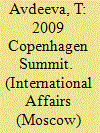

|
|
|
|
|
| Publication |
2010.
|
| Summary/Abstract |
THE UN CLIMATE CHANGE CONFERENCE in Copenhagen on 7-19 December came close to collapse and ended in "taking note of" an extremely contradictory document passed in the dying hours of the conference the Copenhagen Accord whose future remains uncertain. The climate forum in Copenhagen demonstrated yet again that we are still at the very start of a long and thorny path toward developing a universal, comprehensive, fair and efficient strategy of the world community for combating climate change.
|
|
|
|
|
|
|
|
|
|
|
|
|
|
|
|
| 2 |
ID:
100592
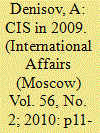

|
|
|
|
|
| Publication |
2010.
|
| Summary/Abstract |
THE SPACE of the Commonwealth of Independent States (CIS) remained a Russian foreign policy priority in 2009. These countries are our close neighbors and strategic partners with which we have common tasks of economic development and modernization, ensuring regional security and achieving a more just world order. Respective principles have been repeatedly confirmed at the highest possible political level, including in D. A. Medvedev's programmatic article, "Forward, Russia!" which was published in September 2009. The correctness of this line was confirmed by the overall development of international processes in 2009, characterized by the growing regionalization of global politics not least under the impact of a global financial and economic crisis and movement toward a polycentric international system.
|
|
|
|
|
|
|
|
|
|
|
|
|
|
|
|
| 3 |
ID:
100597
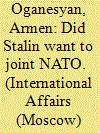

|
|
|
|
|
| Publication |
2010.
|
| Summary/Abstract |
ON 25 AUGUST 1952, Stalin received French Ambassador Louis Joxe for a working meeting at which the ambassador in reply to Stalin's question about the nature of NATO from Charles de Gaulle's perspective hinted that the bloc was an absolutely peaceful structure strictly within the UN Charter. "Stalin laughed and asked Vyshinsky, who was present during the conversation, whether the U.S.S.R. should join it then." Nikolai Kochkin who had spent some time in the Russian Foreign Ministry's archives pointed out: "From every indication, it was simply irony, but it cannot be ruled out that Stalin had some latent intentions" (Mezhdunarodnaia zhizn, No. 1-2, 2009, www.interaffiars.ru). In 1951, Andrei Gromyko repeatedly stated: "If this pact was aimed against the restoration of German aggression, the U.S.S.R. would join NATO."
|
|
|
|
|
|
|
|
|
|
|
|
|
|
|
|
| 4 |
ID:
100608


|
|
|
| 5 |
ID:
100611
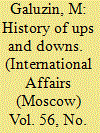

|
|
|
|
|
| Publication |
2010.
|
| Summary/Abstract |
ON 3 FEBRUARY 2010, the diplomatic relations between Russia and Indonesia turned 60. Not a very long period in a historical context, it was full of memorable events. Our countries lived through periods of close cooperation alternating with periods of alienation. Today they have finally arrived at sustainable and multi-dimensional cooperation: Indonesia is one of the most important Russia's partners in Southeast Asia, in the APR and the world. The jubilee has supplied us with a chance to look back at the brightest pages of our bilateral relations, to sum up what has been done and assess the prospects.
|
|
|
|
|
|
|
|
|
|
|
|
|
|
|
|
| 6 |
ID:
100598


|
|
|
|
|
| Publication |
2010.
|
| Summary/Abstract |
THE IMPORTANCE of what is happening in the Middle East, and especially in Iraq, has long transcended the regional boundaries. The situation in Iraq is making a significant impact on the overall international situation and on the positions of many countries, including the most influential ones. Iraq stays in the focus of international politics, and the Iraq issue contributes to the alignment of political forces in many countries.
Whereas the Middle East with its oil and gas wealth can be quite justifiably called the "fuel and energy solar plexus" of modern world, Iraq is its most important component part, which largely determines the normal functioning of this region's oil and gas complex.
|
|
|
|
|
|
|
|
|
|
|
|
|
|
|
|
| 7 |
ID:
100596


|
|
|
|
|
| Publication |
2010.
|
| Summary/Abstract |
IN THE CONTEXT of the security problem, the search for ways of ensuring the stable development and prosperity of the Asia Pacific region is to a very large degree connected to the peaceful resolution of North Korea's nuclear threat. The interests of global security are linked to ways of ensuring regional stability, specifically the nonproliferation of nuclear weapons and other weapons of mass destruction.
North Korea is toughening its rhetoric and action in respect of its program of the development, testing and use of nuclear weapons.
One characteristic feature of the search for regional stability in Northeast Asia is the expansion of international cooperation both in the framework of bilateral contacts and multilateral treaties. The realization of collective efforts, where states have to respond and search for ways to overcome the prevailing situation on the Korean Peninsula, is complicated by North Korea's political strategy, designed to tackle not only foreign but also domestic policy issues. This also involves its position on this issue, which is predetermined not only by the country's complex, if not critical, economic and social situation, but also by the stereotypes of Asian culture with regard to international contacts positing that the potential for conflict is stronger with a weaker partner. At the slightest signs of improvement in the situation, the North Korean political leaders intensify their demands while the search for compromise is seen as a sign of the political weakness of their negotiating partners.
|
|
|
|
|
|
|
|
|
|
|
|
|
|
|
|
| 8 |
ID:
100613


|
|
|
|
|
| Publication |
2010.
|
| Summary/Abstract |
SUPPORT OF COMPATRIOTS is the most important priority of the city government's activity and a key vector in our international relations. Ethnocultural identity and citizens' rights to their native language and culture are sensitive issues for all states. At the same time, we are well aware that in many CIS countries the Russian language is glaringly and severely repressed and the rights of the Russian-speaking population are deliberately and at times cynically violated. A big problem has been unexpectedly and artificially created in recent years with respect to the status of the Russian language and Russian-speaking population in Ukraine. It is the government that has initiated this problem, and not the fraternal Ukrainian people.
|
|
|
|
|
|
|
|
|
|
|
|
|
|
|
|
| 9 |
ID:
100595


|
|
|
|
|
| Publication |
2010.
|
| Summary/Abstract |
THE PAST YEAR, 2009, has, without exaggeration, become very special for the OSCE a period of rethinking the situation in the European security system and the Organization's role and place in the maintenance of stability and the development of cooperation in the Euro-Atlantic region.
Symbolically, for the first time in a long period of the CSCE/OSCE's existence, the foreign ministers of 56 member states met twice at an informal meeting on the Greek island of Corfu (June 27-28) and at a session of the Ministerial Council in Athens (December 1-2). Previously, that only happened in 1991 and 1992, when Europe was going through another period of change. As Russian Foreign Minister S.V. Lavrov justly noted, "it seems that the time has come for Europe to change."
|
|
|
|
|
|
|
|
|
|
|
|
|
|
|
|
| 10 |
ID:
100610


|
|
|
|
|
| Publication |
2010.
|
| Summary/Abstract |
SIX DECADES have passed since the Union of Soviet Socialist Republics was one of the first countries in the world to recognize the young state the Democratic Republic of Vietnam and officially establish diplomatic relations with it. This event occurred on 30 January, 1950. Since then the strong friendship and productive cooperation between our countries has been put to many tests. Historical upheavals did not leave our relations unscathed, but we withstood the challenges of the times with dignity. By preserving and enhancing the achievements, today we have been able to raise our relations, the development of which has been closely related to the historical choice of the peoples of Russia and Vietnam, to a level of strategic partnership and all-encompassing cooperation.
|
|
|
|
|
|
|
|
|
|
|
|
|
|
|
|
| 11 |
ID:
100593


|
|
|
|
|
| Publication |
2010.
|
| Summary/Abstract |
THE EUPHORIA which gripped the nation inspired by Barack Obama's promises of an era of change is gradually subsiding. In mid-January (twelve months after the inauguration), The Washington Post wrote that only three-fourths of the Democrats believe that Obama did brought changes in Washington; three-fourths of the Republicans and independent observers are convinced that he failed to fulfill his promises. According to the Gallup poll (January 2010) 49 percent of the respondents approved what President Obama had achieved against 42 percent who disapproved. In January 2009, when Obama was sworn in as the president the balance was 69 to 13 percent respectively. Today, over 60 percent of the Americans are convinced that the course is wrong.
|
|
|
|
|
|
|
|
|
|
|
|
|
|
|
|
| 12 |
ID:
100607


|
|
|
|
|
| Publication |
2010.
|
| Summary/Abstract |
PRESIDENT MEDVEDEV's Address to the Federal Assembly in 2009 outlines steps towards an effective implementation of Russia's national policy. It is necessary, according to the head of state, to "carry out an intelligent foreign and domestic policy based purely on pragmatic objectives." The focus is on meeting its priorities with account taken of all modern-day realities on the basis of the principles of international law and the UN Charter. The stress is on modernizing Russia's economy and speeding up its reforms.
|
|
|
|
|
|
|
|
|
|
|
|
|
|
|
|
| 13 |
ID:
100603


|
|
|
|
|
| Publication |
2010.
|
| Summary/Abstract |
THE AIM OF THIS PAPER is to briefly present the economic performance of the Russian Federation before the 2008-2009 economic crisis (the "Great Recession"), and the reasons for the comparatively very significant way in which Russia was affected by this crisis.
2. Russia Before the Crisis
WE WILL START by making a description of Russia's pre-crisis growth performance. As pointed out throughout in Vinhas de Souza, 2008, any meaningful discussion of performance (economic or otherwise) must be made in relative terms, in which a given country is compared to relevant benchmarks. This will be done throughout this paper.
|
|
|
|
|
|
|
|
|
|
|
|
|
|
|
|
| 14 |
ID:
100600
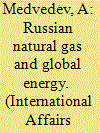

|
|
|
|
|
| Publication |
2010.
|
| Summary/Abstract |
EVERY DISCUSSION on how Russian natural gas contributes to the development of the global energy sector inevitably brings up the question of the role of natural gas in our day and age troubled by global climate change prospects. It might be interesting to reflect on how discussions and policies concerning the cutting of carbon emission may affect our business and what our response to it should be in strategic terms.
I would underscore first of all that we at Gazprom, very much hoped that the Copenhagen climate change summit in December 2009 could conclude a treaty on a global climate change policy to further cut carbon emissions around the world. I am positive that this is essential for cushioning probable substantial impacts of climate change on human life.
|
|
|
|
|
|
|
|
|
|
|
|
|
|
|
|
| 15 |
ID:
100606


|
|
|
|
|
| Publication |
2010.
|
| Summary/Abstract |
THE IMAGE OF MODERN RUSSIA is at present still in the formative stage, gradually transforming into a stable and solid system capable of standing up to the negative impacts of the media environment. Such incompletion, not infrequently coupled with a lack of effective interaction between elements in this system, still leaves a vast information vacuum that is actively being filled with assessments and interpretations that are far from objective and sometimes openly hostile to Russia's interests. As they build up, these negative elements create a basis for the development of false perceptions about our state's position on the international arena and the specifics of its political, economic, and social development.
|
|
|
|
|
|
|
|
|
|
|
|
|
|
|
|
| 16 |
ID:
100601


|
|
|
|
|
| Publication |
2010.
|
| Summary/Abstract |
ON 30 JULY 2009, Prime Minister Vladimir Putin signed government order No. 1055-r discontinuing the provisional application by the Russian Federation of the Energy Charter Treaty (ECT).1 On August 24, in accordance with Article 45 (3-) of the ECT, Russia notified in writing the Charter Depositary (the government of Portugal) of its intention not to become a party to the ECT. Sixty days later, Russia ceased to be a party provisionally applying the ECT. As of October 20, it became (alongside Australia, Iceland, and Norway) a nation that has signed but not ratified the Treaty and does not apply it on a provisional basis, that is to say, it has taken "a step back" while remaining within the Charter process nonetheless.
|
|
|
|
|
|
|
|
|
|
|
|
|
|
|
|
|
|
|
|
|